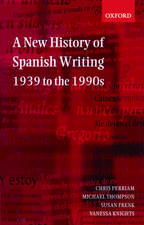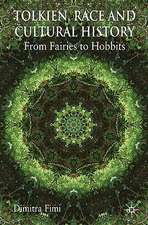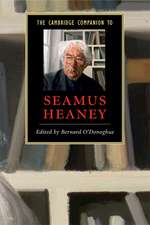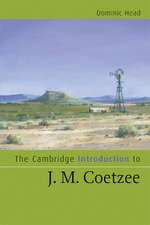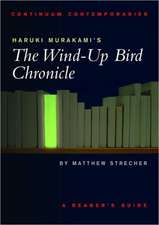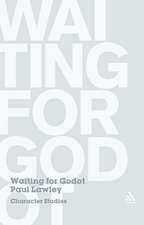Beckett's Books: A Cultural History of the Interwar Notes: Continuum Literary Studies
Autor Dr Matthew Feldmanen Limba Engleză Paperback – 30 apr 2009
This monograph is based on close analysis of the newly-released notebooks and transcriptions compiled by Beckett from 1929-1940, which shed important and unique insight into Beckett's working methods, original sources and literary development. In particular they reveal the central paradox that Beckett's professions of 'ignorance and impotence' were founded upon extensive erudition and academic practices reflecting his interests in philosophy and psychology.
This is the first book to offer an extended study of how recent archival discoveries can contribute to the fundamental transformation of Beckett's truly revolutionary literature.
| Toate formatele și edițiile | Preț | Express |
|---|---|---|
| Paperback (1) | 255.76 lei 6-8 săpt. | |
| Bloomsbury Publishing – 30 apr 2009 | 255.76 lei 6-8 săpt. | |
| Hardback (1) | 889.39 lei 6-8 săpt. | |
| Bloomsbury Publishing – 7 iun 2006 | 889.39 lei 6-8 săpt. |
Din seria Continuum Literary Studies
- 31%
 Preț: 889.23 lei
Preț: 889.23 lei -
 Preț: 257.03 lei
Preț: 257.03 lei - 23%
 Preț: 255.84 lei
Preț: 255.84 lei - 30%
 Preț: 773.65 lei
Preț: 773.65 lei - 23%
 Preț: 255.76 lei
Preț: 255.76 lei - 22%
 Preț: 889.49 lei
Preț: 889.49 lei - 22%
 Preț: 773.39 lei
Preț: 773.39 lei - 22%
 Preț: 889.49 lei
Preț: 889.49 lei - 13%
 Preț: 256.20 lei
Preț: 256.20 lei - 23%
 Preț: 255.76 lei
Preț: 255.76 lei - 31%
 Preț: 891.51 lei
Preț: 891.51 lei - 22%
 Preț: 889.55 lei
Preț: 889.55 lei - 31%
 Preț: 889.49 lei
Preț: 889.49 lei - 22%
 Preț: 772.65 lei
Preț: 772.65 lei - 22%
 Preț: 889.15 lei
Preț: 889.15 lei - 14%
 Preț: 771.84 lei
Preț: 771.84 lei - 22%
 Preț: 888.50 lei
Preț: 888.50 lei - 22%
 Preț: 772.98 lei
Preț: 772.98 lei - 30%
 Preț: 595.82 lei
Preț: 595.82 lei - 13%
 Preț: 258.59 lei
Preț: 258.59 lei - 22%
 Preț: 889.88 lei
Preț: 889.88 lei - 22%
 Preț: 256.29 lei
Preț: 256.29 lei - 14%
 Preț: 652.81 lei
Preț: 652.81 lei - 31%
 Preț: 889.49 lei
Preț: 889.49 lei - 14%
 Preț: 772.17 lei
Preț: 772.17 lei - 22%
 Preț: 888.81 lei
Preț: 888.81 lei - 31%
 Preț: 771.59 lei
Preț: 771.59 lei - 22%
 Preț: 898.95 lei
Preț: 898.95 lei - 23%
 Preț: 256.02 lei
Preț: 256.02 lei - 31%
 Preț: 889.88 lei
Preț: 889.88 lei - 22%
 Preț: 256.59 lei
Preț: 256.59 lei - 22%
 Preț: 886.21 lei
Preț: 886.21 lei - 31%
 Preț: 772.58 lei
Preț: 772.58 lei - 31%
 Preț: 889.08 lei
Preț: 889.08 lei - 30%
 Preț: 774.46 lei
Preț: 774.46 lei - 31%
 Preț: 889.97 lei
Preț: 889.97 lei - 23%
 Preț: 254.84 lei
Preț: 254.84 lei - 28%
 Preț: 373.89 lei
Preț: 373.89 lei - 30%
 Preț: 774.20 lei
Preț: 774.20 lei - 31%
 Preț: 888.50 lei
Preț: 888.50 lei - 22%
 Preț: 889.63 lei
Preț: 889.63 lei - 31%
 Preț: 890.14 lei
Preț: 890.14 lei - 22%
 Preț: 888.50 lei
Preț: 888.50 lei - 22%
 Preț: 888.65 lei
Preț: 888.65 lei - 23%
 Preț: 262.25 lei
Preț: 262.25 lei
Preț: 255.76 lei
Preț vechi: 330.29 lei
-23% Nou
Puncte Express: 384
Preț estimativ în valută:
48.95€ • 50.91$ • 40.41£
48.95€ • 50.91$ • 40.41£
Carte tipărită la comandă
Livrare economică 14-28 aprilie
Preluare comenzi: 021 569.72.76
Specificații
ISBN-13: 9780826443434
ISBN-10: 0826443435
Pagini: 192
Dimensiuni: 156 x 234 x 10 mm
Greutate: 0.28 kg
Editura: Bloomsbury Publishing
Colecția Continuum
Seria Continuum Literary Studies
Locul publicării:London, United Kingdom
ISBN-10: 0826443435
Pagini: 192
Dimensiuni: 156 x 234 x 10 mm
Greutate: 0.28 kg
Editura: Bloomsbury Publishing
Colecția Continuum
Seria Continuum Literary Studies
Locul publicării:London, United Kingdom
Caracteristici
Based on close study of notebooks and transcriptions newly released by the Beckett estate. This is the first text to analyse these key sources, which many scholars are not yet aware exist.
Cuprins
Foreword by Shane Weller
Preface and Acknowledgements
Introduction
1. Theorising 'Misology': Approaching Beckettian Paradoxes
2. Beckett's 'poss': An Introduction to "The Interwar Notes"
3. 'Fallor, Ergo Sum!': The 'Philosophy Notes'
4. 'TEMPORARILY SANE': The 'Psychology Notes'
5. 'Myself I Cannot Save': Geulincx, Mauthner and Beckett
6. Conclusions
Works Cited
Index
Preface and Acknowledgements
Introduction
1. Theorising 'Misology': Approaching Beckettian Paradoxes
2. Beckett's 'poss': An Introduction to "The Interwar Notes"
3. 'Fallor, Ergo Sum!': The 'Philosophy Notes'
4. 'TEMPORARILY SANE': The 'Psychology Notes'
5. 'Myself I Cannot Save': Geulincx, Mauthner and Beckett
6. Conclusions
Works Cited
Index
Recenzii
'Exciting new scholarship that will make quite an impression on the Beckett industry, well written and argued, but especially full of empirical evidence that is so often lacking in criticism.' - Professor Geert Lernout, University of Antwerp
'Feldman's study of Beckett is the first to take the measure of the huge hoard of unpublished notebook material that has become available to scholars in the last few years. For the first time, Beckett's voracious reading in philosophy and psychology during the crucial period of the 1930s is fully documented... As a scholar, Feldman is patient, painstaking and undespotic; as an interpreter, he is theoretically alert and flaring with insight and adventure...By teaching us to read as Beckett himself read, Feldman enables us to read him anew. The effect of this work will be seismic. From now on, Beckett studies will have to be dated "AF" - After Feldman.' -Professor Steven Connor, Birkbeck College, University of London
'Matthew Feldman identifies Beckett's early garnering of knowledge as an essential prerequiste of his later espousal of impotence and ignorance. Beckett's Books explores a central paradox: the empirical foundations of Beckett's quest for a nominalist irony that might yet penetrate the silence.' - Chris Ackerley, University of Otago, New Zealand.
'Matthew Feldman's groundbreaking study Beckett's Books is the first scholarly monograph to take full cognisance of the wealth of new archival material available to Beckett scholars since 2002...Feldman employs, with remarkable results, the principle of falsifiability to Becketts' interwar and postwar development. The Notebooks' primary interest is for the light they shed on Beckett's intellectual development... As Feldman convincingly shows, the Notebooks enable us to trace Beckett's unlearning of systematized knowledge as he reaches towards his artistic goals. A significant outcome of Feldman's study will be the re-reading of extant Beckett criticism in the light of this new archival material, a process already well underway, but one which will doubtless evolve further. As we know, there are many possible Becketts: existential, post-structuralist, psychological, religious, postmodern, political-to name a few. Beckett is a global author whose works seems to evoke cross-cultural and theoretically diverse responses. Feldman's attempt to narrow scholarly focus and, through some astute literary archeology, to re-inject empirical precision into Beckett studies comes at an opportune moment and may well send us scuttling back to the archives in our efforts to delve further.-Benjamin Keatinge, Trinity College Dublin
'Feldman's study of Beckett is the first to take the measure of the huge hoard of unpublished notebook material that has become available to scholars in the last few years. For the first time, Beckett's voracious reading in philosophy and psychology during the crucial period of the 1930s is fully documented... As a scholar, Feldman is patient, painstaking and undespotic; as an interpreter, he is theoretically alert and flaring with insight and adventure...By teaching us to read as Beckett himself read, Feldman enables us to read him anew. The effect of this work will be seismic. From now on, Beckett studies will have to be dated "AF" - After Feldman.' -Professor Steven Connor, Birkbeck College, University of London
'Matthew Feldman identifies Beckett's early garnering of knowledge as an essential prerequiste of his later espousal of impotence and ignorance. Beckett's Books explores a central paradox: the empirical foundations of Beckett's quest for a nominalist irony that might yet penetrate the silence.' - Chris Ackerley, University of Otago, New Zealand.
'Matthew Feldman's groundbreaking study Beckett's Books is the first scholarly monograph to take full cognisance of the wealth of new archival material available to Beckett scholars since 2002...Feldman employs, with remarkable results, the principle of falsifiability to Becketts' interwar and postwar development. The Notebooks' primary interest is for the light they shed on Beckett's intellectual development... As Feldman convincingly shows, the Notebooks enable us to trace Beckett's unlearning of systematized knowledge as he reaches towards his artistic goals. A significant outcome of Feldman's study will be the re-reading of extant Beckett criticism in the light of this new archival material, a process already well underway, but one which will doubtless evolve further. As we know, there are many possible Becketts: existential, post-structuralist, psychological, religious, postmodern, political-to name a few. Beckett is a global author whose works seems to evoke cross-cultural and theoretically diverse responses. Feldman's attempt to narrow scholarly focus and, through some astute literary archeology, to re-inject empirical precision into Beckett studies comes at an opportune moment and may well send us scuttling back to the archives in our efforts to delve further.-Benjamin Keatinge, Trinity College Dublin

